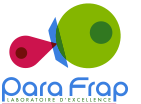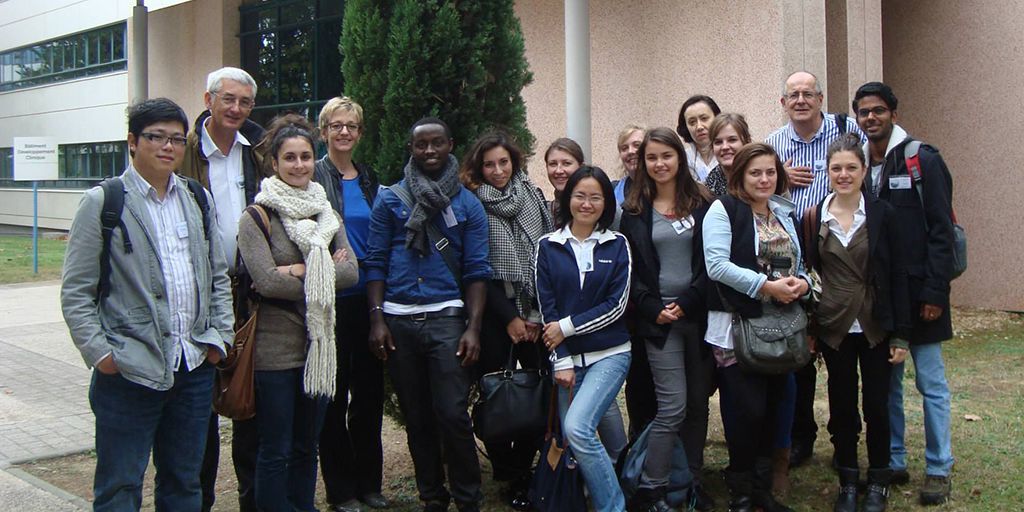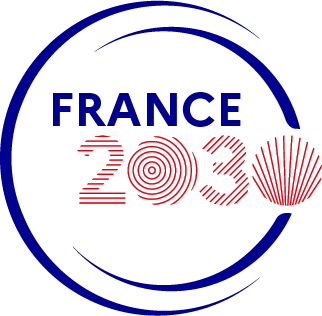

Three training workshops were organized by the LabEx ParaFrap over the 3-year fellowship of ParaFrap's PhD students (one per year):
- An introductory training course
- A bioinformatics workshop
- A training workshop on scientific writing and communication
The “Introductory Training Course in Molecular Parasitology” is organized at the University of Montpellier and brings together all ParaFrap PhD students of each wave. The workshop, held in October 2013, November 2016 and March 2019, was organized by Pr. Patrick Bastien, with the help of Slavica Stanojcic (2013 and 2016), Rosa Milagros Corrales (2019) and Yvon Sterkers (from the University of Montpellier). The first workshop was co-animated by Patrick Bastien and Sabrina Marion (from the University of Lille). This workshop gives students the opportunity to attend presentations by prestigious French and international speakers, from the Universities of Brussels, Glasgow, Heidelberg, Munich, New York, Singapore, Bordeaux, Grenoble, Lille, Marseille, Paris, Strasbourg and Montpellier, with the acknowledged participation of SANOFI® and MAN-ROS THERAPEUTICS® (Programme of the ![]() 2013, 2016 and
2013, 2016 and ![]() 2019Introduction Workshop)
2019Introduction Workshop)
The objectives of the workshop are (i) to create a common base of both "general knowledge" and research spirit in molecular parasitology for all students; (ii) to introduce the students to the partners involved in the LabEx and their research activities; (iii) to create a stimulating "esprit de corps" between students, a potential source for future collaborations; (iv) to promote links and collaborations within the network.
The practical objective of this workshop is to immerse students in modern parasitology for two weeks, with recent data and critical analyses of publications in the field. The general organization of the workshop consists of two lectures in the morning, followed by discussions on scientific papers in small groups in the afternoon. The presentations are organized into thematic blocks: cell biology, parasite genetics, host-parasite relationships, metabolism, drug design, immunogenetics...
The workshop program is intense. Presentations are rather informal to allow for interaction with students. In the afternoon, students present the scientific articles they have read and analyzed previously, so that they can discuss them in groups. Thus, ParaFrap PhD students learn to discover the strengths and weaknesses of certain scientific findings, to better assess the approaches used in research and the limits in experimental design. In addition to these daily training sessions, scientific films may be screened in the late afternoon or evening.
During the first workshop, a full day was dedicated to the domain of private enterprise at Sanofi® in Montpellier. During this visit, students attended a conference offering an overview of preclinical and clinical drug development, and some data on Sanofi® research and development program. According to the students, this day allowed them to broaden their knowledge of R&D in industry and was much appreciated.
During the workshop, students are housed in shared apartments in the city centre and can work and share moments together. These workshops thus create an atmosphere of friendly emulation both among students and teachers. Leaving unforgettable memories to their participants, they create a "school spirit" between ParaFrap partners and PhD students in the field. All these features make these workshops a full success.
The Bioinformatics Workshop was also organized at the University of Montpellier, in January 2015 and July 2017. Participation was mandatory for all ParaFrap PhD students. Also post-docs recently recruited by LabEx were welcome, as well as other doctoral students from various LabEx research groups. The course was organized by Pr. Patrick Bastien (University of Montpellier) and Pr. David Roos (University of Pennsylvania, USA) with the help of Slavica Stanojcic and Yvon Sterkers (Montpellier). It was led by the famous team of "EuPathDB" ("the Eukaryotic Pathogens DataBase"), who is accustomed to giving courses all over the world, and is composed of David Roos, Omar Harb and Suzanne Warrenfelz, with the help of Cameron McPherson and Sebastian Baumgarten, bioinformaticians in Artur Scherf's laboratory at the Institut Pasteur.
The course program includes many exercises on various topics, such as genome navigators, RNAseq interpretation, transcriptomics and proteomics data, sequence analysis, SNPs and the search for patterns,... On the last day, a group project with a final presentation is proposed (see for example the programme of the ![]() Bioinformatics course 2015). The course gives priority to working in small groups, which is both challenging and fruitful, especially for difficult exercises.
Bioinformatics course 2015). The course gives priority to working in small groups, which is both challenging and fruitful, especially for difficult exercises.
During the day or after dinner, seminars are given in a relaxed atmosphere by internationally renowned researchers.
These workshops have been a great success, especially given that many students are often initially reluctant to participate in this field. The evaluation questionnaire completed by the participants revealed an "excellent" satisfaction rate of 90-100%.
This workshop was renewed for the "PhD South" programme in June 2019 in Montpellier, in a longer version, combined with biostatistics (introduction to the R software). It was led by Sebastian Baumgarten (bioinformatician in the laboratory of Artur Scherf, Institut Pasteur) and Sebastian Hutchinson (bioinformatician in the laboratory of Philippe Bastin, Institut Pasteur) for the bioinformatics part; Antoine Claessens (new PI in ParaFrap, unit "LPHI", Montpellier) and Benoit Aliaga (post-doc in Antoine Claessens' team) for the biostatistics part.
Not only do these workshops offer a unique opportunity to become familiar with a research tool that is essential for modern research; but the collective work also allows post-doctoral and doctoral students from different groups in the network to get to know each other, thus stimulating new or existing collaborations.
 |
 |
Scientific writing and oral presentation workshop
A "Scientific writing and oral presentation" workshop was organized in April 2016 and January 2019 at the Institut Pasteur in Paris by Sabrina Marion (University of Lille) supported by Pr Parick Bastien and animated y a private company. This course introduced students to the basic principles of scientific writing, international rules for structuring a scientific report, and gave them advice for an effective scientific presentation. This workshop is particularly useful in the 3rd and final year of the thesis for doctoral students. Due to the quality of the training, it is very successful among students.
Gordon Research Conference 2026 – Biology of Host–Parasite Interactions The 2026 Gordon Research Conference (GRC) on Biology of Host–Parasite Interactions will take place June 7–12, 2026, at Salve Regina University, in...
The INSERM workshop “Modern methods in molecular parasitology” will take place in Montpellier, France, from 4–6 November 2026. This event will bring together leading experts in...
The 15th CAPF (French Anti-Parasitic and Anti-Fungal Consortium) workshop will take place on 16–17 March 2026 in Strasbourg (France). This event is an excellent opportunity for students and postdoctoral researchers to participate and contribute...
Call for Applications: New Junior Research Groups at Institut Pasteur The Institut Pasteur has launched an international call to recruit new junior group leaders.This is a unique opportunity for high-potential scientists to...
JOB : Ingénieur·e d’étude / Research Engineer – Mosquito Immunity (IBMC, Strasbourg) 🇫🇷 Le laboratoire Mosquito Immune Responses recrute un·e ingénieur·e d’étude à l’IBMC (Strasbourg). La personne recrutée sera en...
Applications are now open for the 2026 Biology of Parasitism (BoP) course, taking place June 12–July 23, 2026 at the Marine Biological Laboratory in Woods Hole, MA.This intensive 6-week program offers PhD students and postdocs advanced training in...
Newcastle University offers a full-time, fixed-term position (3 years) for a Research Assistant or Research Associate in Molecular Parasitology — funded by the Medical Research Council (MRC). About the Opportunity Location:...
Multidisciplinary PhD opportunity in the fields of infectious diseases, gene regulations and molecular signalisation. Fully Funded 4-Year PhD at the University of York A fully funded PhD opportunity is available at the...
The EMBO Workshop 2025 “Host–Parasite Relationship: From Mechanisms to Control Strategies”, took place from October 5–8, 2025, on the beautiful Île des Embiez (France). Organized within the framework of the LabEx ParaFrap and...
Postdoc (M/F) in molecular and biochemical parasitology (Toxoplasma gondii) A 24-month post-doctoral position starting on January 2026 and funded by the French National Research Agency (ANR) is available in the in the...

© 2023. All rights reserved MLCOM
Notre site LabEx ParaFrap utilise des cookies pour réaliser des statistiques de visites, partager des contenus sur les réseaux sociaux et améliorer votre expérience. En refusant les cookies, certains services seront amenés à ne pas fonctionner correctement. Nous conservons votre choix pendant 30 jours. Vous pouvez changer d'avis en cliquant sur le bouton 'Cookies' en bas à gauche de chaque page de notre site. En savoir plus
Ce site utilise des cookies pour assurer son bon fonctionnement et ne peuvent pas être désactivés de nos systèmes. Nous ne les utilisons pas à des fins publicitaires. Si ces cookies sont bloqués, certaines parties du site ne pourront pas fonctionner.
Ce site utilise des cookies de mesure et d’analyse d’audience, tels que Google Analytics et Google Ads, afin d’évaluer et d’améliorer notre site internet.
Ce site utilise des composants tiers, tels que NotAllowedScript699e4335abb35ReCAPTCHA, Google NotAllowedScript699e4335ab804Maps, MailChimp ou Calameo, qui peuvent déposer des cookies sur votre machine. Si vous décider de bloquer un composant, le contenu ne s’affichera pas
Des plug-ins de réseaux sociaux et de vidéos, qui exploitent des cookies, sont présents sur ce site web. Ils permettent d’améliorer la convivialité et la promotion du site grâce à différentes interactions sociales.
Ce site web utilise un certain nombre de cookies pour gérer, par exemple, les sessions utilisateurs.

